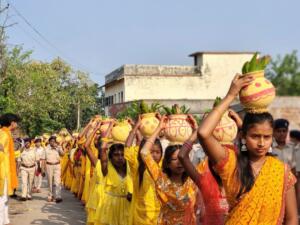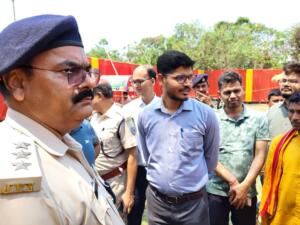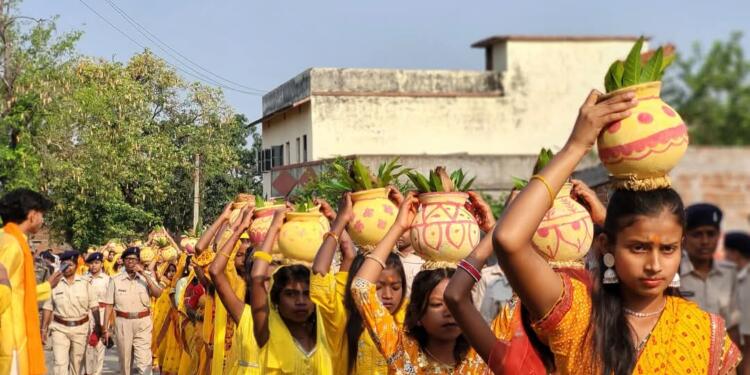In what can only be described as an alarming case of religious suppression in their own homeland, the Hindu community of Amlatanr village, under Govindpur block in Dhanbad, Jharkhand, found itself battling not just for spiritual expression but for basic dignity. A peaceful, sacred Kalash Yatra, a traditional Hindu ritual marking the opening of a temple had to take place under the shadow of police deployment, drones, and heavy administrative surveillance, all because Islamist elements opposed the procession’s passage.

The Kalash Yatra, part of a 3-day Pran Pratishtha ceremony for the newly built Shri Shri Kali Mandir in Govindpur, was meant to carry holy water from the Khudiya River to the Yagna site. The water is used for consecration rituals central to Hindu temple inauguration. But there’s only one practical route from the temple site to the river and it passes by a local mosque. That’s all it took. Despite the fact that the Yatra was religious, non-political, and peacefully organized by local villagers most of whom have lived there for generations, Islamists raised objections. They insisted the route could not pass by the mosque, even though no religious slogans or instruments were being used, and the procession was to be carried out quietly, with women leading the way.

This wasn’t the first time such a blockade happened. In 2017, a mutual agreement was made concerning certain religious processions like Ram Navami, Durga Visarjan, Muharram, and Barawafat. But this Kalash Yatra wasn’t even part of that agreement. Yet, Islamists claimed violation of that pact conveniently misinterpreting it to block even non-conflicting Hindu practices.
Let’s be clear: No Hindu procession was entering the mosque, disrupting prayers, or engaging in any provocation. The only “offense” was that the path passed by the mosque a public road, not private property. If this logic is accepted, Hindus will soon have no access to rivers, roads, or even their own religious duties in villages where they’re now minorities. Even worse, attempts were made to resolve the issue through dialogue. Temple organizers reached out, only to be rebuffed. Eventually, the administration had to deploy 17 magistrates, over 200 police personnel, and senior officials including the SDM and three DSPs all just to allow villagers to carry water in a Kalash.
The result? Only women were permitted to carry out the Yatra and that too under police protection, as if they were doing something illegal. This incident shines a light on a larger, troubling trend: growing Islamism and an aggressive assertion of veto power by Islamist hardliners, even in areas where Hindus have historically lived. If a Kalash Yatra can be opposed, what comes next?
























